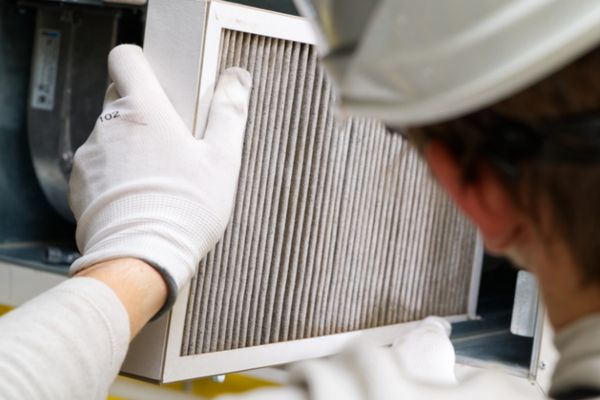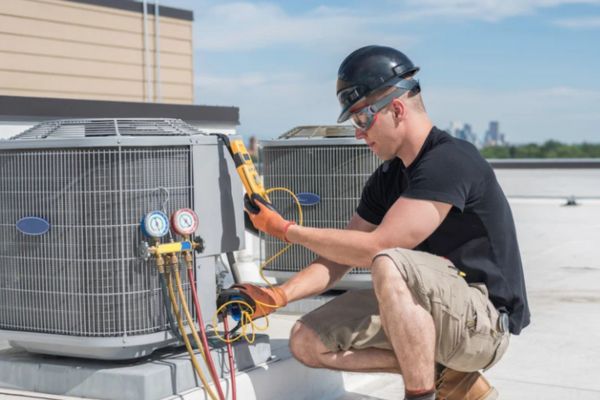Maintaining your HVAC filter is essential for optimal system performance and energy efficiency. Regular cleaning or replacement prevents dirt buildup, reducing strain on your HVAC system and minimizing costly repairs. Clean filters ensure efficient airflow, allowing your HVAC system to work smoothly and save on energy bills. Routine maintenance reduces wear and tear, helping your system last longer without major issues.

Understanding MERV Ratings: A Guide to Filter Efficiency
MERV (Minimum Efficiency Reporting Value) ratings measure a filter’s effectiveness in trapping particles. Understanding these ratings helps you choose the right filter for your needs, balancing air quality with system compatibility.
- MERV 1–4: Basic filtration, suited for larger particles like pet hair and dust but not adequate for air purification.
- MERV 5–8: Moderate filtration captures smaller particles, such as pollen and mold spores, improving air quality.
- MERV 9–12: High-efficiency filtration traps even finer particles like lead dust, suitable for better indoor air quality.
- MERV 13–20: Advanced filtration, ideal for environments requiring high-level air purity, such as healthcare, though not typically compatible with residential systems.
Choosing the Correct MERV Rating for Your System
Selecting a filter with the correct MERV rating is crucial to maintaining system health. While high-MERV filters capture smaller particles, they also reduce airflow, which can strain your HVAC system.
- Avoid Overloading Your System: A filter with a MERV rating that is too high may restrict airflow, causing inefficiencies or even mechanical issues.
- Consult an HVAC Professional: If unsure about the right MERV rating, consult your HVAC contractor or check your system’s specifications for guidance.
Types of HVAC Filters: A Comparison
There are several types of HVAC filters, each offering unique benefits and limitations. Choosing the right one depends on your home’s air quality needs and HVAC system capabilities.
A. Flat-paneled fiberglass filters
These disposable filters are low-cost and provide basic protection for HVAC components but are limited in air purification capabilities.
- Pros: Affordable and easy to replace.
- Cons: Only captures large particles, leaving finer pollutants in the air.
B. Pleated Media Filters
Pleated filters offer higher efficiency with moderate MERV ratings, balancing cost-effectiveness with decent filtration capabilities.
- Pros: Effective at capturing smaller particles without significant airflow resistance.
- Cons: Not as effective as HEPA filters for high-level air purification.
C. HEPA Filters
HEPA (High-Efficiency Particulate Air) filters provide the highest level of air filtration, capturing 99.97% of particles as small as 0.3 microns.
- Pros: Ideal for those with severe allergies or in need of very clean air.
- Cons: Typically incompatible with residential systems without system modifications.
D. Reusable Air Filters
Washable filters are a sustainable option, though they often have lower MERV ratings and require diligent cleaning to avoid mold growth.
- Pros: Cost-effective and eco-friendly due to their reusability.
- Cons: Low filtration efficiency and may risk mold if not thoroughly dried after washing.
Key Considerations Before Choosing a Filter
Selecting the right HVAC filter goes beyond MERV ratings. Consider your home’s specific air quality needs, system compatibility, and maintenance requirements.
- Match Filtration with Your System: Ensuring compatibility with your HVAC system prevents airflow issues and maintains system health.
- Set Realistic Air Quality Goals: High-MERV filters are beneficial but may only be necessary for some households; find a balance that meets your needs without overburdening your system.
- Seek Professional Advice: For upgrades or specific requirements, consult an HVAC specialist to make the best choice for long-term efficiency and performance.
Conclusion
Selecting the right HVAC filter can improve indoor air quality, reduce energy costs, and protect your system from wear. By understanding your filtration needs and the different options available, you can make a confident decision that keeps your home comfortable and your HVAC system running smoothly. Regular maintenance and choosing a suitable MERV rating will ensure your HVAC system provides clean, efficient air for years.



